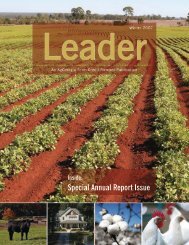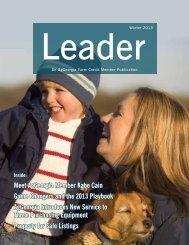AgGeorgia Farm Credit
AgGeorgia Farm Credit
AgGeorgia Farm Credit
- No tags were found...
You also want an ePaper? Increase the reach of your titles
YUMPU automatically turns print PDFs into web optimized ePapers that Google loves.
Your Good <strong>Credit</strong>Understanding Your <strong>Credit</strong> ReportBy A. Michael Rupured, UGA Extension Consumer Economics SpecialistWhat do you do when someone asks toborrow money or a personal item from you?Your decision about whether or not to lendwill likely be based upon your perception ofthat individual’s character, his or her capacityto pay you back, any collateral offered inexchange, perhaps your knowledge of capitalthey hold in reserve, and conditions— thesituation they are in and the cost to you. Wecall these factors the Five C’s of credit.Lenders and other entities rely uponthese same factors when making decisionsabout whether to do business with consumersand businesses. Instead of gut reactions andinformal agreements, the world of credit reliesupon formal agreements that are regulated bythe federal government. Federal law determinesthe information that can and cannotbe used by lenders, employers, and others tomake decisions about doing business withyou. When you complete an application toapply for a loan, lenders cannot ask aboutyour age, religion, race and other factors thathave nothing to do with your ability to repaythe loan. <strong>Credit</strong> Reporting Agencies (CRAs)collect information about you from financialinstitutions, court documents, public records,companies with which you do business,your employers and other entities. CRAsmake money by charging for access to theinformation they have collected about youfor a wide variety of purposes including toverify information you provide on job andcredit applications.The CRA file about you is your creditreport. Your credit report documents the FiveC’s of credit as they relate to you and is thebasis for your credit score. Understandinghow your credit report is compiled and usedis essential for your long term economic wellbeingand overall financial security.In a 2005 Government AccountabilityOffice (GAO) survey, the average score ona knowledge test about credit reports andcredit scores given to consumers was just55 percent. Two-thirds of the respondentswere unable to correctly name any of themajor <strong>Credit</strong> Reporting Agencies (CRAs).An equal percentage did not know that credithistories could impact insurance premiumsand possibly even employment. Nearly threefourths(72%) did not know that CRAs investigateincorrect information on one’s creditreport for free. Lastly, more than half (52%)were not able to identify factors that affectedcredit, and nearly one-third (32%) did notknow the definition of credit score.Establishing, maintaining, andprotecting Your Good <strong>Credit</strong> can save youthousands of dollars over time and maymean the difference between you and yourcompetition for job opportunities. Federallaw (FACTA) allows all consumers toobtain one free credit report every year fromEACH of the three major CRAs (Equifax,Experian and TransUnion). You can requestyour first free copy from each CRA online(http://www.annualcreditreport.com) or tollfree (1.877.322.8228). Georgia residents areentitled to a second free credit report fromeach of the three major CRAs. To obtain yoursecond free copy you need to contact eachCRA individually. When you use the Internet,they may ask for a credit card number beforedetermining that you are a Georgia residentand eligible to receive a free copy. Providinga credit card number is not required whenyou call the toll free number for each CRA.Negative information in your report thatis accurate remains on the credit report forseven years; ten years in the case of Chapter 7bankruptcy. Positive information may remainon your report indefinitely, but is often purgedafter seven years. Negative information mayreappear at a later date if the obligation isstill outstanding.If your credit report contains inaccurateinformation, follow the instructions thatcame with the report for disputing errors.The CRA has 30 days to confirm receipt ofyour inquiry, and 60 days to investigate. Youmay need to contact the creditor reportinginaccurate information about you to clearup the problem. Once the problem hasbeen resolved, wait two or three monthsand request a copy of your credit report tomake sure the inaccurate information hasbeen removed.<strong>AgGeorgia</strong>.10.Autumn 2012










